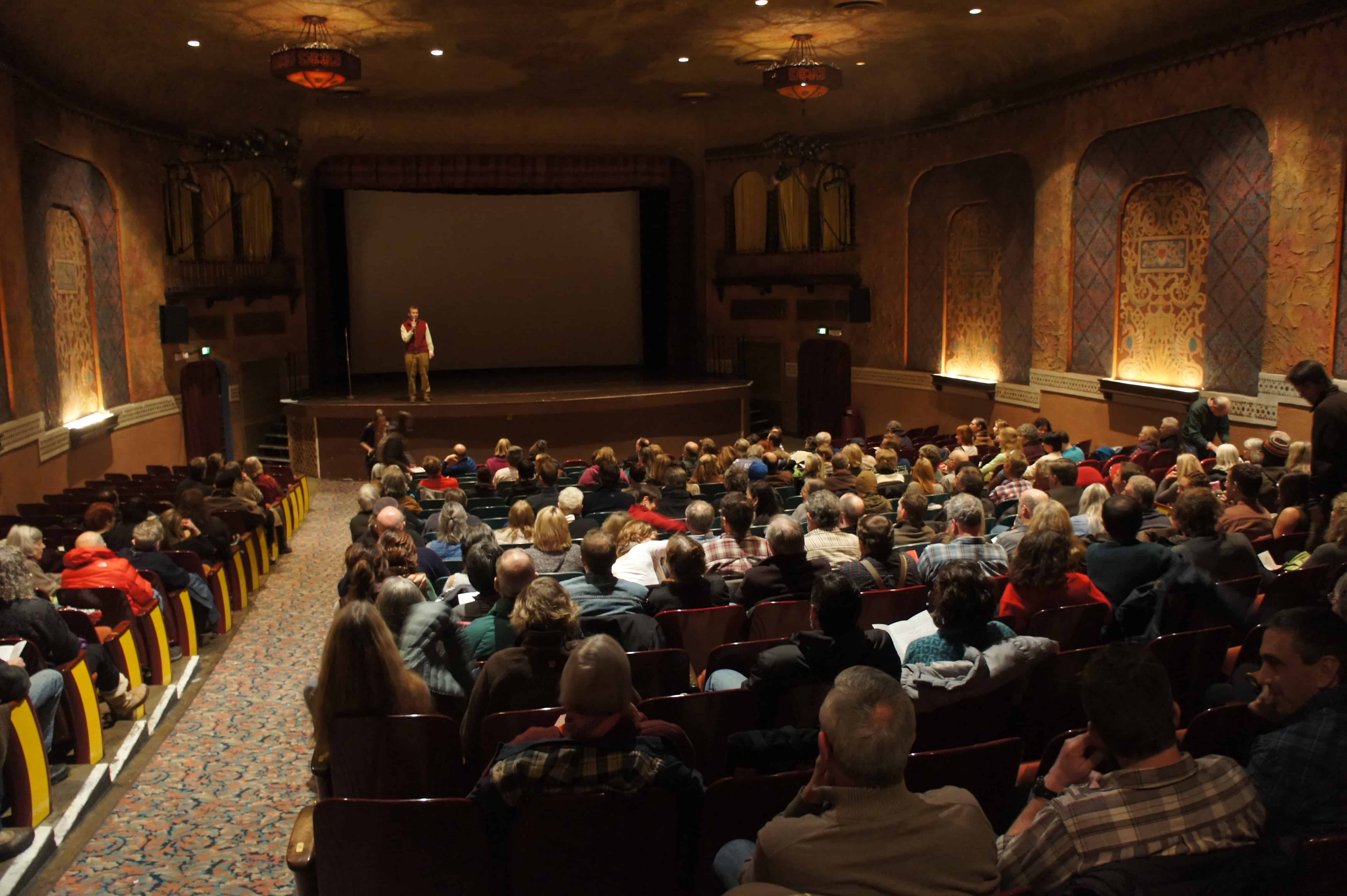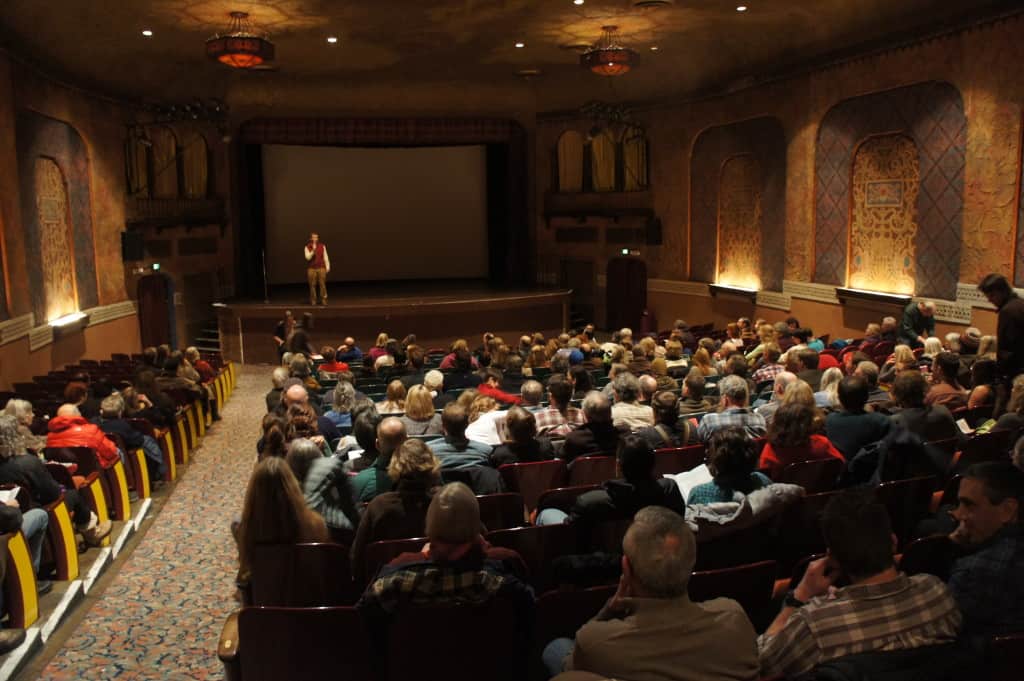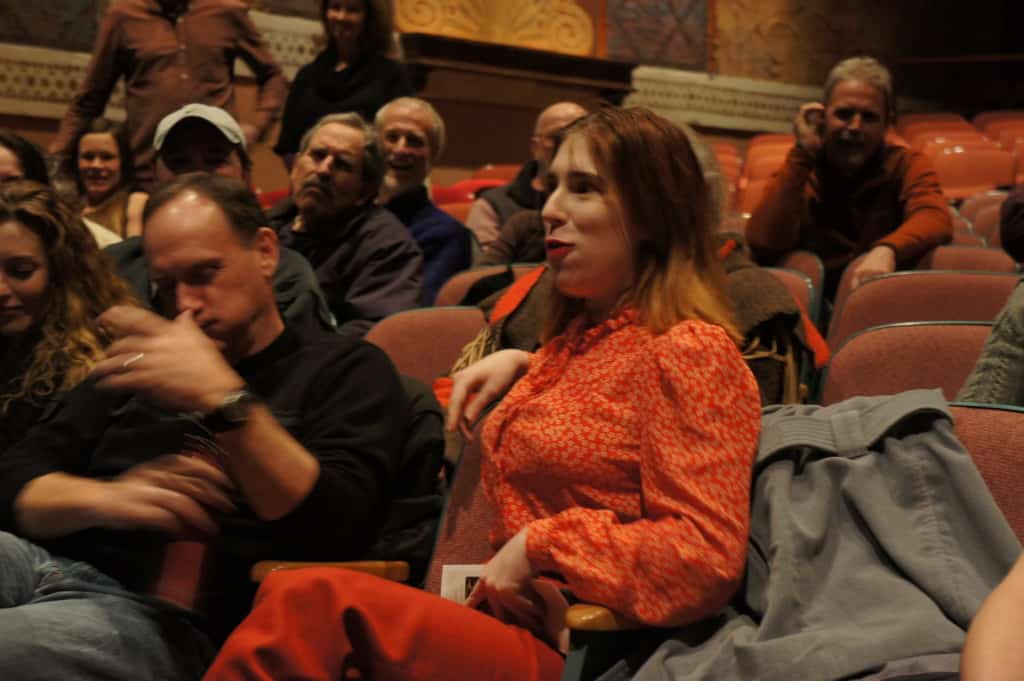I was one of the 260 voyeurs watching a group of men be emotional. We all were spectators to the Sandpoint Men’s Group weekly meetings by watching a documentary film, About Men produced by Maja Bugge, a Danish filmmaker from NYC.
These men were screaming, crying, questioning and laughing as they met. There were times when the men got up out of their chairs to physically express how they were feeling in ways that only men can. For one man, the emotional struggle he’d felt for years suddenly was a literal enactment of that struggle. His resistance, anger and fear were live.
Watching this film, we were witnesses to these emotions. We were virtually in the room with the men, while experiencing our own emotions—holding our breath in shock, crying with the men, and laughing from the ironic experiences life bring. The theater quickly became a big men’s group. All of us spectators were propelled into a men’s group as participants that night. This men’s group of 260 came about because of this documentary.
Longing to fill what is missing
For two decades, my ”growing up different drove me to find more than a fix. I was determined to cure what felt like a curse—a “curse” I finally realized was my Asperger’s Syndrome, dyslexia, dyspraxia and ADHD… As the symptoms of my “disorders” dissolved, the hidden gifts manifested. But it became more apparent to me that something outside my mental difficulties was still missing.
My mind began working in ways I never thought it could. I was carrying on conversations without thinking about what to say. I became coordinated. If someone threw me a ball, I could catch it. My sensitive emotions were being expressed—and received. My life started to feel normal, as normal as I would want to be.
As my abilities increased so did a deep sense that there was more. I began to realize my masculine limitations… and I realizedI didn’t feel like I was a man. But this time, after acknowledging my differences, and knowing how they set me apart from so many others, I saw I was not alone. Virtually every man I spoke to about this felt the same inadequacies and longing for brotherhood. Knowing I wasn’t the only one was comforting, yet I quickly realized there was no one who could help me—or these other men.
So I helped myself. In the mid-1990s, I started developing men’s groups. In 2005, I stepped back to completely overhaul the design of men’s groups, which led me form the Sandpoint Men’s Group (SMG).
Maja Bugge called me after not being able to find one single men’s group in NYC, a city of eight million people, who wanted to participate in a documentary. So Maja called me asking if SMG would be interested in being filmed. I asked my fellow SMG men if they would volunteer to have a woman and her crew film us and our secrets. Their commitment and courage to share how the group filled what was missing for them, so other men could experience the same benefits, gave Maja a yes.
I sat in the theater next to my partner, Kirei (who is so supportive, she drove down from Calgary for the US premiere) and a few hundred of my friends. Surrounded by love and support, I felt the tears run down my face. I (we) had fulfilled my quest: I felt like a man, I had the relationship I always dreamt of, and I had my brotherhood and my community. Thirty-five years of healing what others told me was impossible. A twenty-year journey to be my own man. And I am finally in a place where I feel whole. There are no more missing pieces.
Never before
Our town of eight thousand nurtured the growth of SMG to four groups in nine years, with a history of more than 150 men participating. Today we receive international requests to offer training in operating men’s groups and in the creation of a powerful micro-community. Before the film showing we had articles in our town paper and the Spokane, WA paper (Spokane is the closest “big” city, 75 miles away). The film was also featured in the bi-annual Sandpoint Magazine and on the local radio station twice.
The brotherhood SMG created spread to creating a micro-community of families and friends, which evolved to be its own community: if a man or his family needs something,there’s always someone there. We celebrate many of the events of life together, be it a birthday, graduation, or the arrival of summer. This community isn’t virtual; it’s very real.
The impact the group and the film have had on our community was demonstrated when we stayed after the film to answer questions from 50 people. These people wanted to know more about the group and us. The impact of SMG was best expressed by Maya Pignolet, 15-year-old daughter of Wayne. one of the men in the film and group:
When I was younger, my Dad started going to this thing every Wednesday. Men’s group it was called, and I thought, “Oh great, men gathering around and talking about their feelings. Gross.” But then something changed, we talked more, there was less fear in everything we said, and when there was, we’d address it.
Over time, this way of communicating didn’t just change our family, it changed other people, too. Whenever we had an argument at school, or on fieldtrips, they’d send for the Men’s Group Dads, they’d talk it out with us and get down to the base of what was really going on. A fight about two girls having a sleepover when one was supposed to hang out with another, could lead, without guidance, to a full out brawl, but with them it usually turned into a hug circle with all of us crying about how we loved each other.
At the beginning, my Dad started to respond to my angry jabs calmly with a, “How does that make you feel?” I usually answered with, “It makes me feel like I want to punch you,” Or something along those lines. That changed, my answers turned into ones that cut to the center of the problem, which was most often fear.
It took me a while to get that other families didn’t talk like this. My parents didn’t yell at me in front of my friends because my room wasn’t clean, or because I didn’t do all my home work. There was no awkward dog petting by my friends while I was being shamed.
This was a common occurrence in other houses I visited, but not in mine. People started to notice, more friends were adopted into our family, and they spent more time at our house than theirs. I’ve heard so many times, how much they wished my family was theirs, and because we talked about everything.
I’ve been so blessed to have had the Men’s Group in my family’s life, the way it did. My parents aren’t just family, they’ve become my best friends, all because of the simple fact that we talk about everything that’s going on in our lives. So, if you ever have a chance to join the Men’s Group, do. It changes lives, after all.
We are in different stages of planning to offer the film and our Q & A for men and women in Calgary (link to purchase tickets), Chicago and Cleveland. I never expected my quest to be a man would lead to SMG, and then taping a documentary, leading into an emotional zeitgeist for men and women. I certainly never expected a 15-year-old young woman to speak so powerfully to 50 people, and write about it to share with the world how a men’s group impacted her world.
It’s time
The Longevity Project’s Howard Friedman, PhD, explains how the best predictor of longevity is a strong social network. Communities bestow a sense of fulfillment and belonging that counteracts loneliness and depression—two strong indictors for deteriorating health for men.
Men are particularly alone. We drive through adult life alone often competing against other men. We grow old and then die alone. Yet deep in every man is a need for brotherhood. We want to contribute to men and others. We want to receive from these men—an often scarier proposition.
If the response to the film proved anything, it proved that men can step up and create their own brotherhood—and thattheir larger community can get behind it to honor the men. The response from the film also shows how enthusiastic women are supporting men finding their own independence and interdependence.
One of the stories of the film brings home how a small group can go as far as to save a man’s life: in the depression of losing his fortune, business and pride, rather than go the suicide route, a man calls his brothers and asks for the help that turned him around.
Join the revolution
Rebel against what keeps you from being free. Make your friends your comrades. Support each other in breaking free of the limiting binds of the culture and stress, then come together to champion your brothers’ and sisters’ success. That is what SMG gave me, and what it offers to others.
Weeks after the screening of the documentary in our town, people are still coming up to us on the street to thank us for showing the film. These people are asking how they can show the film to their friends, appreciating how we showed men in a new light or thanking us for how the film brought Sandpoint together.
Get free of what’s not working. Create a deep life with others. Be an instigator of your own tribe. Use this film to be a catalyst in your community… and in your life.
What’s next?
Take that first action right now. Stream the movie with a friend. Contact us about coming to your town to show the movie and support your own local revolution. Download the free protocols for starting a men’s groups from our nonprofit, www.mencorps.org. And there is the option to doing a Free to Win Experience, a two day men’s group hosted by MELD.
Tell us what you are doing to create your own tribe to fill what is missing in your life.
UPDATE: Stories about the film was also run in Commercial Appeal in Memphis, TN and the Sacramento Bee in Sacramento, CA



[…] Why Didn’t Someone Tell Me I Could Have This? […]